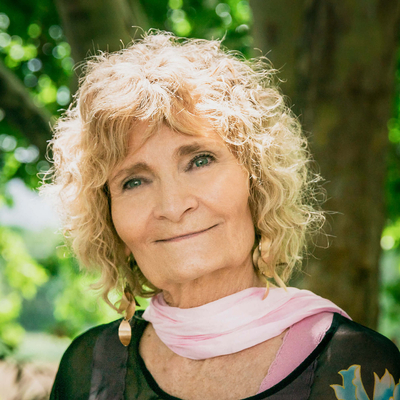As a child brought up in a Christian home where prayer was an ongoing conversation with a loving and personal God, and regular church attendance included a variety of sects—from conservative Baptist to more liberal Methodist services, from simple Mormon meetings to ornate Catholic masses—I have always understood God to have many faces and facets. Not only was God present in various Christian-oriented churches, I experienced His presence in the Native American ceremonies in which I took part. (I grew up on four different Native American reservations in Arizona and returned to the San Carlos Apache Reservation to live and teach for many years after graduating from college.) I knew God was present with me, and within me, at all times, whether I was surrounded by loving family and friends or roaming the desert mesas in solitude, seeing divine pattern in the natural world that seemed so much a part of me. I communed with God who I experienced as my First Father, and I saw a reflection of my First Father in my biological human father who also walked with God and practiced what he felt was Godly living.
As a college student I took part in anti-war and civil rights demonstrations, listened to music that challenged the values and lifestyles of status quo America, and avidly studied the theology of religions that were not “Christian.” At the same time I continued to practice my own brand of spirituality with a living, personal God being the center. Though the God of my childhood was as vast and as mysterious as the night skies upon which I had contemplated, the God of my youth continued to grow and expand as I learned of other religions, other cultures, other philosophies, and other political views. To me the world was wide and filled with the beauty of God, manifested in so many ways. But I also experienced much confusion and conflict when I encountered ugliness and evil, the opposite of God's beauty and goodness. Life became a huge paradox, for as I grew in my understanding of the world, I realized to a greater degree the levels of goodness that can be in an individual and in a society as well as the levels of evil.
In my late teens and early twenties, I lived in a world where its youth was raging at the injustices, evil, and stupidities of society and government. I was one of those youth, and I too raged, but in a much quieter, more contemplative manner than most of my peers. Often, when the campus was filled with loud activist activity, music, and chanting demonstrators (me being one of them), I would feel a strong inner pull to remove myself from the noise and the activity and enter the small chapel at the center of campus to adjust my whole being to being in sync with God. If I did not listen to the pull, then I would feel an imbalance and agitation deep within me that could last for days, even weeks or months.
That strong inner pull remains with me, and still in the winter of my life, if I do not adhere to the call of that pull, I experience some degree of instability and imbalance, for I know I am not in sync with my First Father, God, and His divine pattern and universal (literally) laws that are dictated by love, a love beyond what we humans understand to be love. From where I sit at this present moment in time and space, I don't see much of divine pattern of God's laws being understood or practiced on this world. In fact, I share the opinion with many other individuals of many religions (and even those who profess no belief in any kind of “God”) that what the majority refer to as “God” and “Godliness” is almost opposite of what God is about (or what He or She would be about if the entity existed).
An essay, “The Christian Paradox,” by Bill McKibben1, a Christian activist and author of many books, exposes the travesties of fundamentalistic, conservative Christianity. Interestingly, only a small percentage of people have an elementary, basic understanding of what the Bible really says. Many of their beliefs that they think come from the Bible or that Jesus taught actually come from twentieth- and twenty-first century ministers' and politicians' renditions and interpretations of a fraction of Biblical scripture that, taken out of context of the entire Bible, supports a pet theory or political stance.
Bill McKibben is not alone in his assessment of the actual origins of popular Christian theology. For example, Dr. Tony Campolo, professor emeritus of Sociology at Eastern University and media commentator on religious, social, and political matters points out that the ideology upon which many Christians base their religious, political, and social views originated with a narrow and limited theology created by John Darby, a nineteenth-century Anglican priest from Plymouth, England2. So, what many Christians in this country think comes from the Bible actually comes from John Darby and a few strongly-opinionated men following his leanings who have loosely interpreted a small portion of the “sacred scripture” to support their very focalized religious, social, and political agendas. I think this is probably the case in all of the other world religions; so much that is considered the teachings of the person who originated them has been distorted and twisted beyond recognition by many believers, even the majority in some cases!
Most of the pet theories that are being proclaimed today among many American Christians support the materialism of an economy-driven dominant culture and the U.S. government's current policies and activities that, according to many serious Biblical scholars and Christians who take the entire Bible into consideration when forming their interpretations, are unGodly and contradictive of Jesus' teachings. Thus, “the dominant theologies of the moment…undercut Jesus, muffle his hard words, deaden his call, and in the end silence him.”3
More than thirty years ago, I read several books written by twentieth-century Christian theologians which challenged that status-quo consciousness of most Christians. The Comfortable Pew and The Cost of Discipleship are just two titles that indicate that being a practitioner of Jesus' true teachings is not comfortable and, in fact, is costly on many levels. As a college student on a serious search for enhanced spiritual meaning in my life and in the society in which I lived, I struggled with a popular Christianity that I perceived was based on superficial, selfish values. As a young woman in my twenties and thirties, I, along with other Christians and non-Christians, continued to recognize at deeper levels that dominant Christianity was, as Bill McKibben phrases it, a: “soft-focus, consumer gospel,” a “comfortable, suburban faith,” what I would refer to as a non-Jesusonian religion, regardless of Jesus' name being touted. This American brand of Christianity that slants toward a “comfort-the-comfortable, personal-empowerment faith” and “veils the actual, and remarkable, message of the Gospels”4 seems to me to be Godless even though the name God is used recklessly and often by “Christian” religious and political leaders.
In one stage of my life, in my mid-twenties, I had a poster on my living room wall that stated: “God is a girl.” I also had a bumper sticker that claimed that God was a motorcycle rider. By that time in my life I had already realized that though God was a personality, He (and She) was not to be boxed in by us humans and our narrow, limited, childish understandings of who and what “God” is. As I have continued to grow and unfold over the decades, I have had my temporary times of neurosis and instability (what I think celestial personalities might consider temporary moments of cosmic insanity), but I eventually settle down and adhere to the call of the inner pull that at times can be so strong that there is no way for me to ignore it and at other times so subtle and soft that I have to really be paying attention to adhere.
I have had my dry spells, my dark nights of the soul, my own griefs and internal struggles. I have experienced deep doubting, and I have gone through times of feeling ashamed and repentant. I have had my personal tragedies, having to go through a process of adjustment in the face of great loss. But who hasn't? Whether an individual claims to be a person who has some belief in a God or not, I do not think there is a human being on this planet who has not gone through his or her own moments of crisis and unraveling. There is not a person on Earth who has not struggled with simply being alive, whether the struggle is simply to stay alive or the struggle is more of an internal, philosophical, and theological one.
What is that inner pull that so many of us experience throughout our lives? I think that the pull is God, the First Father who is within all of us humans, a Fragment of the Father, His Spirit that coordinates with the Spirit of the Mother aspect of God that is also within each of us. The presence of a personal God within and around me is more real for me than anything else in my life—more real than my loving friends and family, more real than the natural world that is so much a part of me, more real than any religion, society, or belief system of which I am a part, more real than any physical or psychospiritual pain I may be experiencing, more real than death.
“God” has so many aspects, attributes, levels, and dimensions that we humans have not even begun to touch or realize. What a travesty to put God into the box of any religion, race, nationality, political perspective, social institution, creed, or dogma! Frankly, I think that most religions have a small smattering of spiritual truth; the rest is human-made dogma, theories, superstitions, etc. And yet I consider myself a religious person, for I have been blessed in experiencing an aspect of God in almost every religion that I encounter. Maybe that is because I have the circuitry of God within me that enables me to recognize His (or Her) truth and reality wherever it resides. Maybe that is why some other humans share this spiritual unity with me, regardless of our differing theological, social, and political views. After all, we all have the Spirit of Truth within us that can be activated if we hear and adhere to the inner pull. All of us humans have this circuitry, and it is our destiny—as individuals and as humankind—to eventually manifest spiritual unity within our diversity and uniqueness.
We can experience this spiritual unity regardless of the names we call God.
Of all the names by which God the Father is known throughout the universes, those which designate him as the First Source and the Universe Center are most often encountered. The First Father is known by various names in different universes and in different sectors of the same universe. The names which the creature assigns to the Creator are much dependent on the creature's concept of the Creator. The First Source and Universe Center has never revealed himself by name, only by nature. If we believe that we are the children of this Creator, it is only natural that we should eventually call him Father. But this is the name of our own choosing, and it grows out of the recognition of our personal relationship with the First Source and Center.5
How about this:
When you have once become truly God-conscious, after you really discover the majestic Creator and begin to experience the realization of the indwelling presence of the divine controller, then, in accordance with your enlightenment and in accordance with the manner and method by which [God is revealed to you], you will find a name for the Universal Father which will be adequately expressive of your concept of the First Great Source and Center. And so, on different worlds and in various universes, the Creator becomes known by numerous appellations, in spirit of relationship all meaning the same but, in words and symbols, each name standing for the degree, the depth, of his enthronement in the hearts of his creatures of any given realm.6
Here's another wonderful revelation about God that I continue to discover to be true:
The Universal Father never imposes any form of arbitrary recognition, formal worship, or slavish service upon the intelligent will creatures of the universes. The evolutionary inhabitants of the worlds of time and space must of themselves—in their own hearts—recognize, love, and voluntarily worship him. The Creator refuses to coerce or compel the submission of the spiritual free wills of his material creature.7
Seems contradictive of what many religions teach and practice, doesn't it. But it also makes more sense and rings more true within our heart of hearts if we ascending sons and daughters of God (mortals) are really honest with ourselves and with each other.
In a cosmic nutshell: God is absolute and experiential. God is ultimate and supreme. God is qualified and unqualified. God is actuality and potentiality. God is material, mind, and spirit. God is father, mother, and child. God IS!!!!!! Oh, the mystery!
1 “The Christian Paradox,” Bill McKibben, Harper's Magazine, August 2005
2 “The Ideological Roots of Christian Zionism,” Tony Campolo, Tikkun, January/February 2005, p. 19
3 Direct quotes taken from: “The Christian Paradox,” Bill McKibben, Harper's Magazine, August 2005, p. 36
4 Ibid.
5 The URANTIA Book, Paper 1, Section 1. For a further beginning study of “God,” I recommend reading Papers 1 through 5 in The URANTIA Book — “The Universal Father,” “The Nature of God,” “The Attributes of God,” “God's Relation to the Universe,” and “God's Relation to the Individual.”
6 Ibid.
7 Ibid.


